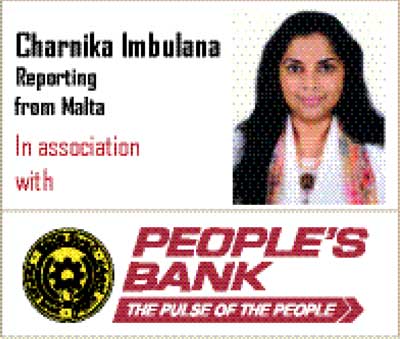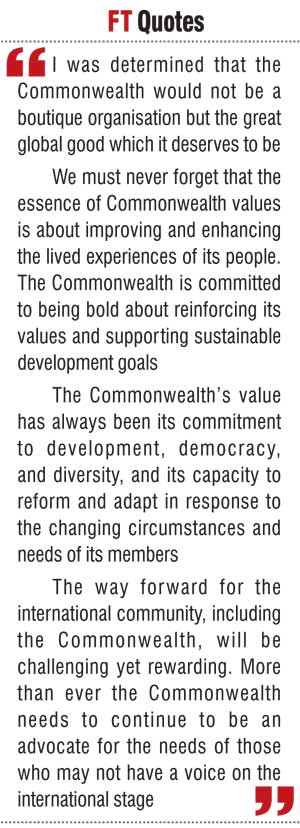Monday Feb 16, 2026
Monday Feb 16, 2026
Friday, 27 November 2015 00:00 - - {{hitsCtrl.values.hits}}

Outgoing Secretary General of the Commonwealth Kamalesh Sharma
On the eve of the end of his tenure as Secretary General of the Commonwealth, Kamalesh Sharma is one contented gentleman. The Commonwealth of Nations, commonly known as the Commonwealth, an intergovernmental organisation of 53 member states, has come a long way, standing tall and is forward thinking.
Sharma, who will end his successful tenure of eight years in office, granted his very last official exclusive interview as the outgoing Secretary General of the Commonwealth to the Special Correspondent of the Daily FT at CHOGM Charnika Imbulana, immediately after the first press conference on the CHOGM held with the Prime Minister of Malta Dr. Muscat, at the intercontinental yesterday (26).
In response to the first question on how he reflects on the achievements on the eve of the end of his tenure as the Secretary-General, he related the first interview he was compelled to give almost immediately after his appointment as the new Secretary General way back in 2007. Soon after Sharma had been selected as the Secretary General, a microphone had been thrust on him and he had been unprepared when he was asked of his ambitions as the new Secretary General. He says the response he gave was spontaneous, which he adds he has not been able to improve on since: “What I said was I was determined that the Commonwealth would not be a boutique organisation but the great global good which it deserves to be.”
Towards that, Sharma has tirelessly worked, true to his words. “Serving two terms as Secretary-General of the Commonwealth has been an enormous privilege and honour. I look back on my tenure with many wonderful memories of my interactions in public life and also with staff of the Commonwealth Secretariat.
“During my time as Secretary-General, I have been tremendously fortunate to have visited every Commonwealth country, meeting our collective family and citizens from all around the world. I firmly believe there is no other association like the Commonwealth — our diversity is manifest in our 53 independent and equal sovereign states, home to more than 2.2 billion citizens, with every member country of the Commonwealth having an equal voice and equal representation.”
Following are excerpts of the interview:
Q: Could you recall some of the most memorable moments in office?
A: Seeing Queen Elizabeth sign the Commonwealth Charter in 2013 was a personal and professional highlight for me. The Charter brings together the values and aspirations which unite the Commonwealth —including democracy, human rights and the rule of law. It is our collective spirit and a defining document for an inclusive and accountable Commonwealth.
A clear and objective measure of the way in which the Commonwealth adds global value can be seen in various highly regarded regional assessments in which Commonwealth member states have been consistently given high rankings on good governance and other measures, true to their membership of the Commonwealth as a values-based organisation.
We must never forget that the essence of Commonwealth values is about improving and enhancing the lived experiences of its people. The Commonwealth is committed to being bold about reinforcing its values and supporting sustainable development goals.
Recent Commonwealth Heads of Government Meetings, and other Commonwealth Ministerial gatherings, have actively contributed fresh perspectives and wisdom to international discussions and towards finding innovative solutions on matters relating to food, security, digital technology, youth enterprise, small states and the environment.
The Commonwealth has always maintained that global outcomes must be inclusive, equitable and embrace all human communities, irrespective of size and endowment. We have been in the forefront of global advocacy on behalf of small states, and raising awareness and practical approaches to meet their distinctive needs.
I hope my term will be seen as one of commitment, pragmatism, diligence and ambition in advancing the wellbeing of our Commonwealth family and the Commonwealth as a great global good.

Q: What progress has the Commonwealth made during your tenure as Secretary General and on what?
A: The Commonwealth’s value has always been its commitment to development, democracy, and diversity, and its capacity to reform and adapt in response to the changing circumstances and needs of its members.
The Commonwealth is special in its work as a champion for young people and small states, empowering them to participate in decision-making processes. Global leaders are increasingly aware we must partner with young people in realising our shared future.
As young people will be the ones living with the decisions made today, they should help shape them. The Commonwealth now has robust youth networks—including the Commonwealth Youth Council, the Commonwealth Alliance for Young Entrepreneurs, the Commonwealth Students Association and the Commonwealth Youth Climate Change Network — offering new platforms for collaboration to ensure that the voice of young people is heard on the international stage.
The Commonwealth has also cultivated strategic partnerships beyond the Commonwealth and has continued to advance the Commonwealth voice on issues of global significance. The Commonwealth’s strong relationship with the G20 in association with La Francophonie has brought valuable new opportunities for the Commonwealth to convey the concerns of its members not represented around the G20 table—particularly those of the smaller and more vulnerable states.
The Commonwealth’s advocacy work has helped increase international awareness of the challenges small states face and the solutions needed.
ITC innovation has revolutionised the way the Commonwealth communicates through online platforms and ‘hubs’, allowing countries and governments to exchange information, learn from each other and share experiences in education, health and economic sectors.
Our Commonwealth vision and set of values are set out with fresh clarity in the Commonwealth Charter, which was adopted by all member states in 2012 and heralds a new era in shaping our shared future.
We are particularly fortunate to have a strong family of organisations actively committed to advancing the goals and values of the Commonwealth, and to connecting the people and institutions of our member states in multiple ways and to mutual benefit. Through their programmes and initiatives, civil society organisations have helped strengthen some of the most fundamental rights and freedoms necessary to build stronger and better democratic societies.
Q: What of the future of the Commonwealth?
A: The world is moving into a new period of international development and multilateral cooperation. The Commonwealth, through harnessing its young, its values of democracy and diversity, and a deep commitment to development, will continue to remain relevant well into the future and improving the lives of all its Commonwealth citizens.
The Commonwealth, home to a third of the world’s people, is a modern and bespoke organisation, which realises that in serving its member states, there is also a parallel duty in working for the global good — we are, after all, global citizens.
The way forward for the international community, including the Commonwealth, will be challenging yet rewarding. More than ever the Commonwealth needs to continue to be an advocate for the needs of those who may not have a voice on the international stage.
The partnerships and relationships the Commonwealth has fostered over the years, with international and civil society organisations, will put the Commonwealth in good stead in contributing to a world that is equal, just and stable for future generations
Q: How do you view CHOGM Malta 2015?
A: Each CHOGM has a distinctive character and makes its own special contribution to advancing Commonwealth cooperation and collective action by the governments and people of our member states to build resilience, and to advance social and economic progress. I anticipate the CHOGM theme, ‘Adding Global Value’, will generate fruitful discussion and agreement on pragmatic steps the Commonwealth can take in being an exemplary global leader in supporting the global development agenda.
CHOGM is taking place during a critical year when the world determines the path forward on significant global issues, particularly development and climate change. CHOGM will be an opportunity for leaders to discuss and highlight issues of particular concern to the Commonwealth in these matters.
We expect to officially launch several new initiatives during CHOGM, particularly to assist small states’ development capacity. The Climate Change Finance Hub, for example, will be an online tool for knowledge exchange as well as best practice information sharing and collaboration.
More than half of Commonwealth countries are small island states which most keenly feel the impact of climate change — their very future may depend on the ability to tap into the ocean economy. Malta’s position as a small island state makes it the ideal setting for a discussion on the opportunities of the blue economy and a shared sustainable future.
The Commonwealth Youth Forum will be a time to reflect on the 2015 theme, ‘A Young Commonwealth’, and recognise young people’s significant impact and valuable contribution as agents of change in their communities.
The Commonwealth’s commitment to diversity and equality is manifest in its commitment to facilitate opportunities for diverse groups to have their voices and needs heard. This year, for the first time, the Commonwealth hosted a Women’s Forum in the wings of CHOGM. And of course—on the first day of CHOGM, 27 November— today! My successor, the sixth Commonwealth Secretary-General will be chosen by the Heads of Government.